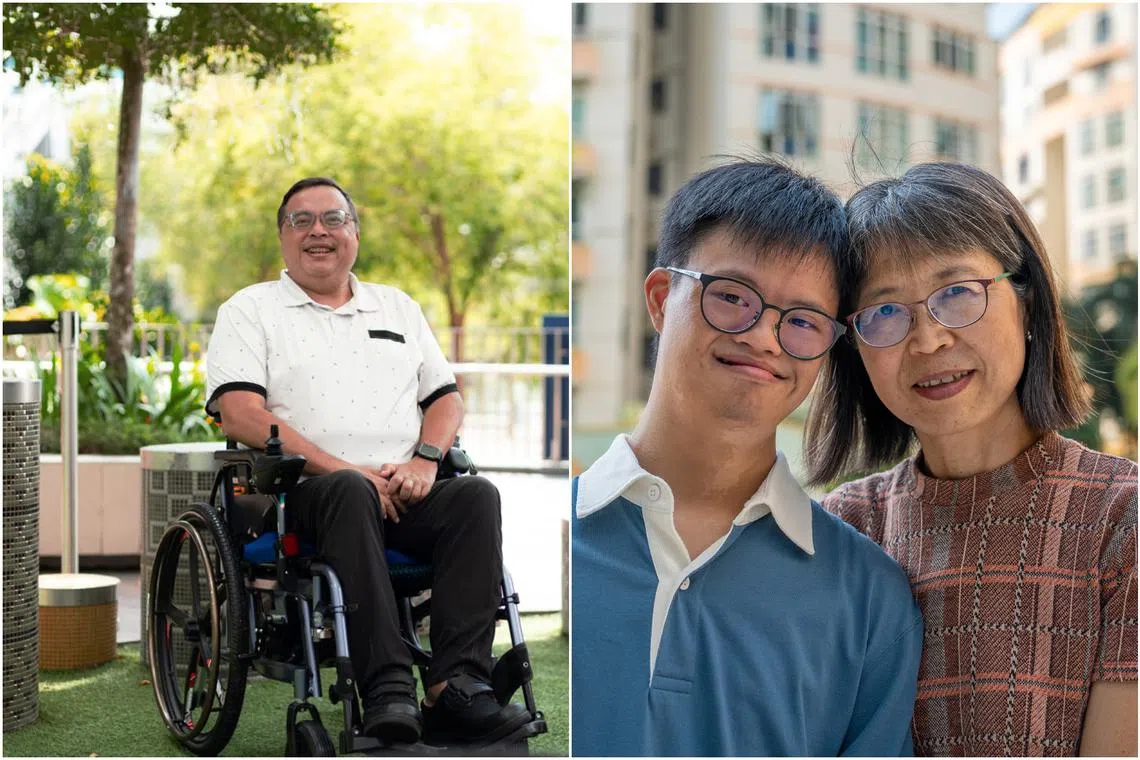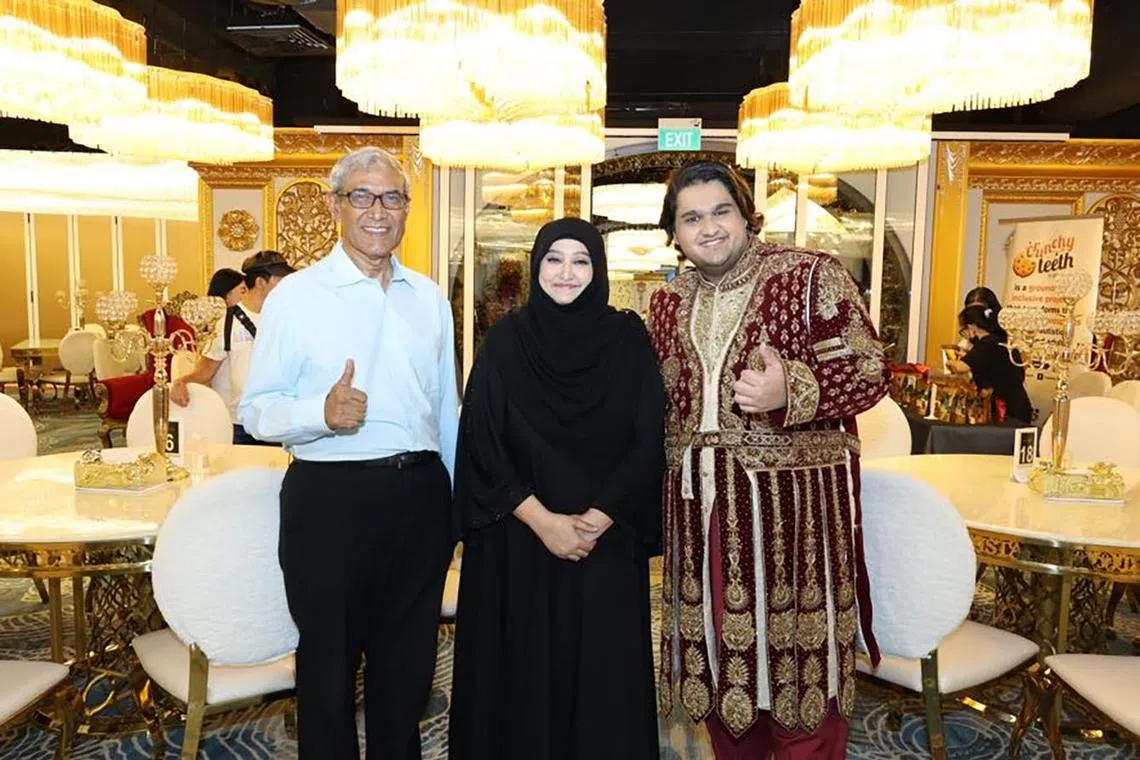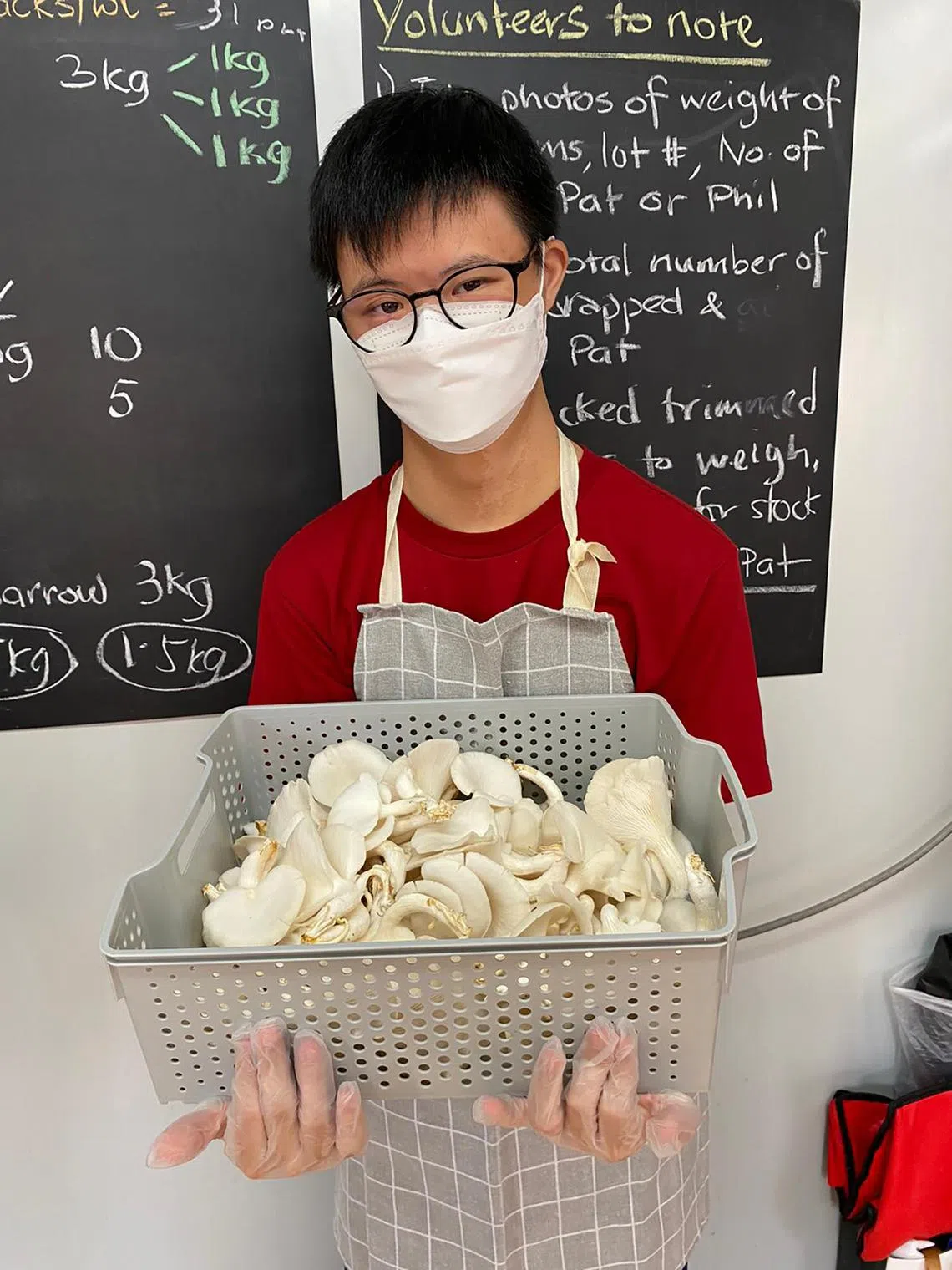‘We will surpass expectations’: People with disabilities call for a fair shot at work
Sign up now: Get ST's newsletters delivered to your inbox

(From left) Mr Warren Sheldon Humphries; and Mr Allan Cai with his mother Li Shuyun.
PHOTOS: KENNETH LOW FOR IAMINVISIBLE, LI SHUYUN
SINGAPORE – On his third day as a customer service executive at an education centre, Mr Warren Sheldon Humphries was told by the branch manager to pack up and go as his bearing “traumatised” students. He has mobility issues and walked with a gait.
In his next job as a trainer at a train-and-place company during the Covid-19 pandemic, his boss did not hesitate to let him go once the work started to move offline.
Mr Humphries, 54, has Charcot-Marie-Tooth disease, which causes the progressive loss of muscle tissue and the sense of touch, and now uses a wheelchair.
While incidents like these are rare now, they illustrate plainly the persistent attitudes that prevent Singapore from reaching its goals of a disability-inclusive workforce.
On Sept 16, recommendations were announced to help 4,500 more people with disabilities in Singapore get jobs by 2030. Several task forces were set up under Singapore’s Enabling Masterplan 2030
A task force set up to promote inclusive employment laid out plans to expand employment opportunities for people with disabilities through gig work, and to better equip job coaches.
Another task force looking at community living announced that up to 250 adults with disabilities will join a pilot in the next three years, where they receive support, including care and coaching services, to live independently in the community.
Mr Humphries said he was unemployed for two years during the pandemic, and volunteered as a tour guide at an event at the Enabling Village. A man who was on his tour turned out to be the founder of travel agency Tribe Tours, and later offered him a job as a tour guide.
Today, Mr Humphries gives tours at the Enabling Village and on Sentosa.
“We broke the tourism paradigm that only able-bodied people can do this job,” he said.
He said his employer’s flexibility about his working arrangements helps, as he can conduct tours in the morning and head home to work in his other role as Tribe Tours’ community and partnerships lead. His home set-up includes a larger monitor and a keyboard with a plastic casing that helps with his hand tremors.
Mr Humphries currently has to spend time in hospital for dialysis and rehabilitation after a leg amputation, and he uses his time there to do administrative work.
He also gives talks at schools and curated tours on Sentosa for wheelchair users, in a tie-up between the company, Sentosa Development Corporation and SG Enable.
“I started as a docent, and now I’m going beyond that, planning routes and giving talks,” he said.
“If you give us the opportunity, we will surpass expectations.”
Mr Humphries said hiring people with disabilities for gig work is possible for Tribe Tours as it works with different companies, which may want to do tours on a more ad hoc basis.
Other examples of gig work opportunities cited by SG Enable include artist, mover, researcher and sign language instructor.
Ms Esther Chong, director of employment services at disability charity SPD, said that while workplaces are becoming more accessible physically, access in other areas, such as information and communication for employees with hearing loss or visual impairment, may still be lacking.
In a previous organisation, Mr Adrian Yap, who is deaf, struggled when his requests for video calls went unheeded, leaving him unable to use closed captioning to follow the discussions on phone calls.
The 45-year-old data analyst applied to work at Standard Chartered Bank in 2021 after attending its workshops on disability awareness.
“It was very different from the previous organisations I worked in, because I had never encountered such a training component that touched on disability awareness,” he said.
Now, he readily participates in video calls where he uses closed captioning, as well as in in-person meetings where he uses a transcription software.
He still faces challenges when people speak at the same time, the environment is noisy, or the transcription is inaccurate, in which case he asks his colleagues to repeat themselves or to type out the words.
To other job seekers with hearing loss, Mr Yap encourages them not to be shy about asking for accommodations to be provided for them during job interviews.
“They will be able to perform better at the interview,” he said. “If they do not have that kind of support, they will find it hard to communicate with people, and it may cause a lot of friction and misunderstanding.”
Mr Muhammad Arshad Fawwaz, 27, has autism and attention deficit hyperactivity disorder, but has run an online talent show for those with special needs for four years, taught school students animation and coding, and is now in university studying Arabic before deciding on a course.
After graduating from ITE College Central with a Nitec qualification in digital animation in 2016, he had trouble staying in a job.
He could not fit in at work, and was affected by gossip and mean comments. He also got stressed and confused when managers and co-workers gave him contradicting instructions.
During this time, the aspiring performer also auditioned to act in shows, but realised no one was taking him up as he declared his autism during sign-ups. One company told him it was afraid he would not be able to deal with the pressures of the work.
Out of work during the pandemic, Mr Arshad took the opportunity to start Inclusivity 4 All, an online talent show for those with special needs. “People with special needs have their own skills to share.”

Mr Muhammad Arshad Fawwaz with his mother and former senior minister of state Zainul Abidin Rasheed at Inclusivity 4 All’s concert on Dec 15, 2023.
PHOTO: INCLUSIVITY 4 ALL
His efforts to promote inclusivity led him to win several awards and opened the door to other opportunities, such as acting in an SG Enable advertisement.
He also took a course in leadership, and started working freelance in 2017, teaching primary and secondary school students animation, coding and about leadership. This turned out to be his longest gig yet – nearly six years – and sparked his interest in going back to school, both to learn and teach.
Mr Arshad is now studying overseas, and is exploring becoming a religious teacher when he returns to Singapore in six years.
Ms Jacelyn Lim, executive director of Autism Resource Centre (Singapore), said more companies can tap people on the autism spectrum, noting that one of the biggest misconceptions is that these individuals cannot work, or can do only simple, repetitive tasks.
She said adults on the autism spectrum may face challenges with social communication and flexibility in thinking, and work best in structured environments with clear tasks and deliverables.
But they are good with tasks that require attention to detail and accuracy, such as research, data input or word processing, or which have a clear procedure to follow – for instance, archiving, library work or filing, baking and packing.
The centre’s job coaches train them in soft skills such as good work habits, managing feedback and workplace communication.
Ms Lim said employers can help them by making workplace instructions explicit and visual, developing communication scripts to express needs, ask for help or seek clarification, and breaking down complex tasks into smaller steps.
More supported employment opportunities are now available, note some caregivers, who say the future is also looking brighter for those with intellectual disabilities.
Madam Li Shuyun’s son Allan Cai has Down syndrome. He has worked with social enterprise Mushroom Buddies for three years, harvesting and packing mushrooms that are then sent to restaurants.
The 25-year-old works there twice or thrice a week, from 9am to 1pm. Having shorter hours in the morning helps those with special needs who may have shorter attention spans, said his mother.

Mr Allan Cai, who has Down syndrome, has worked with social enterprise Mushroom Buddies for three years, harvesting and packing mushrooms.
PHOTO: COURTESY OF LI SHUYUN
There are also volunteers at the farm to help him and five other workers with special needs.
Madam Li said: “I hope he can take more responsibility in this company, and eventually be able to live independently.”
Mr Cai is also a Down syndrome advocate, and his efforts help people realise, for instance, that those with his condition can have many hobbies, know how to dance and play the piano, travel independently, volunteer and even hold down a job, Madam Li said.
SPD’s Ms Chong highlighted the importance of preparing abled employees to work alongside people with disabilities.
Citing incidents where co-workers felt unhappy when the work that these individuals were unable to perform was handed to them, she said: “This is where job carving and greater understanding and buy-in from the rest of the workforce become crucial.”
Correction note: This story has been updated for accuracy.


